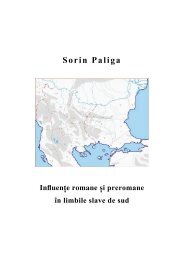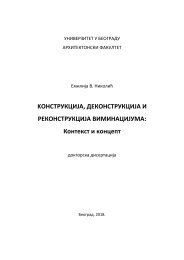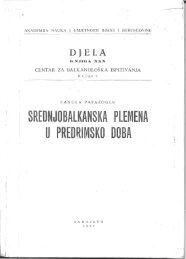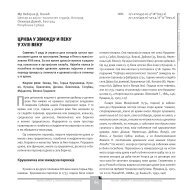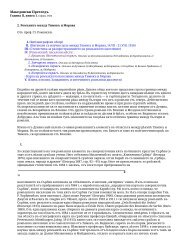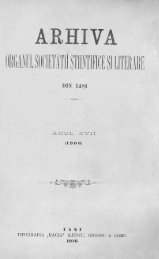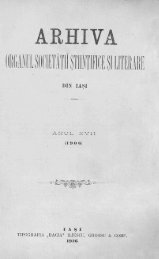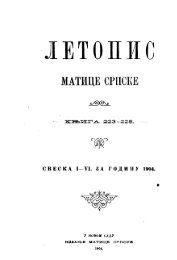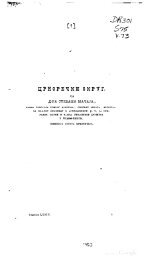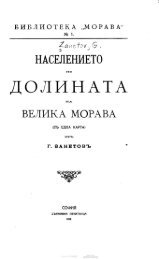The Construction of National Identity and its Challenges in Post-Yugoslav Censuses
You also want an ePaper? Increase the reach of your titles
YUMPU automatically turns print PDFs into web optimized ePapers that Google loves.
<strong>The</strong> <strong>Construction</strong> <strong>of</strong> <strong>National</strong> <strong>Identity</strong> <strong>and</strong> <strong>its</strong> <strong>Challenges</strong> 895<br />
TABLE 4<br />
Census Results from the Bay <strong>of</strong> Kotor (Montenegro), 1991–2011<br />
1991 2003 2011<br />
Montenegr<strong>in</strong>s 27,396 44.60 24,270 34.87 26,108 38.68<br />
Serbs 13,418 21.84 29,360 42.17 26,435 39.17<br />
Croats 4,910 7.99 5,223 7.50 4,519 6.70<br />
<strong>Yugoslav</strong>s 11,703 19.05 509 0.73 311 0.46<br />
Undeclared n/a 6,028 8.66 6,129 9.08<br />
Total 61,430 69,611 67,496<br />
<strong>of</strong> <strong>Yugoslav</strong>s (Isailović, 2011). Vukovar, on the Danube, was the town with the highest<br />
number <strong>of</strong> <strong>Yugoslav</strong>s <strong>in</strong> 1991, with 29.17 percent <strong>of</strong> the population. However, <strong>in</strong> Vukovar,<br />
violence <strong>and</strong> group polarization not only eroded the category <strong>of</strong> <strong>Yugoslav</strong>s, but also reduced<br />
the space for ambiguity. In 2011, less than 2 percent <strong>of</strong> the town’s <strong>in</strong>habitants selected any<br />
ambiguous identity category, such as regional identity, unknown, or unidentified identity.<br />
Due to significant population shifts dur<strong>in</strong>g the war, a large number <strong>of</strong> <strong>Yugoslav</strong>s have<br />
left the town, <strong>of</strong>ten emigrat<strong>in</strong>g, thus the decl<strong>in</strong>e <strong>of</strong> the <strong>Yugoslav</strong>s is not only attributable<br />
to shifts <strong>in</strong> self-identification. Elsewhere, <strong>in</strong> Croatian municipalities with a high level <strong>of</strong><br />
prewar <strong>Yugoslav</strong>s, identity choices are considerably less ambiguous than <strong>in</strong> the other two<br />
cases. This would suggest that polarization <strong>of</strong> similar identities, even if the ma<strong>in</strong> period<br />
<strong>of</strong> ethno-national mobilization was <strong>in</strong> the 1990s, reduced the space <strong>of</strong> contest<strong>in</strong>g the<br />
dom<strong>in</strong>ant identity categories subsequently.<br />
Muslims<br />
Like <strong>Yugoslav</strong> identity, the national identity <strong>of</strong> Muslims has been closely associated with<br />
socialist <strong>Yugoslav</strong>ia. <strong>The</strong> majority <strong>of</strong> <strong>in</strong>tellectuals <strong>and</strong> ethnic entrepreneurs <strong>in</strong> post-<strong>Yugoslav</strong><br />
states adopted the category <strong>of</strong> Bosniaks over Muslims, as noted earlier. However, this shift<br />
has not been universally accepted. In Montenegro, Muslims account for a share <strong>of</strong> 38.31<br />
percent <strong>of</strong> Bosniaks (20,537 vs. 53,605). A similarly high number can be identified <strong>in</strong><br />
Croatia with a share <strong>of</strong> 24.01 percent (7,558 Muslims vs. 31,479 Bosniaks). However, <strong>in</strong><br />
Serbia, Muslims account for only 15.35 percent <strong>of</strong> Bosniaks (23,303 vs. 145,278). Muslim<br />
identity has been well established <strong>and</strong> has a clearly ethno-national signifier, encompass<strong>in</strong>g<br />
the Islamic Slavic population that spoke Serbo-Croatian <strong>in</strong> <strong>Yugoslav</strong> times. Thus, Muslim<br />
identity is an example <strong>of</strong> an identity category that has lost <strong>its</strong> ma<strong>in</strong> proponents, but not<br />
<strong>its</strong> support among some citizens. As a result, it has few prom<strong>in</strong>ent ethnic entrepreneurs<br />
promot<strong>in</strong>g the category. <strong>The</strong> most active organizations promot<strong>in</strong>g Muslim identity are <strong>in</strong><br />
Montenegro, where the term “Bosniak” has met most resistance <strong>in</strong> census results (Tomović,<br />
2011), mostly as the the term Bosniak implied Bosnia as a k<strong>in</strong> state.<br />
Complex <strong>Identity</strong> Comb<strong>in</strong>ations<br />
<strong>National</strong> identities, as noted above, are not solely def<strong>in</strong>ed through the self-identification<br />
with a nation, but also through religious <strong>and</strong> l<strong>in</strong>guistic identity. Thus, the identity packages<br />
<strong>and</strong> their acceptance by citizens constitute a crucial test <strong>of</strong> the success <strong>of</strong> ethnic entrepreneurs






